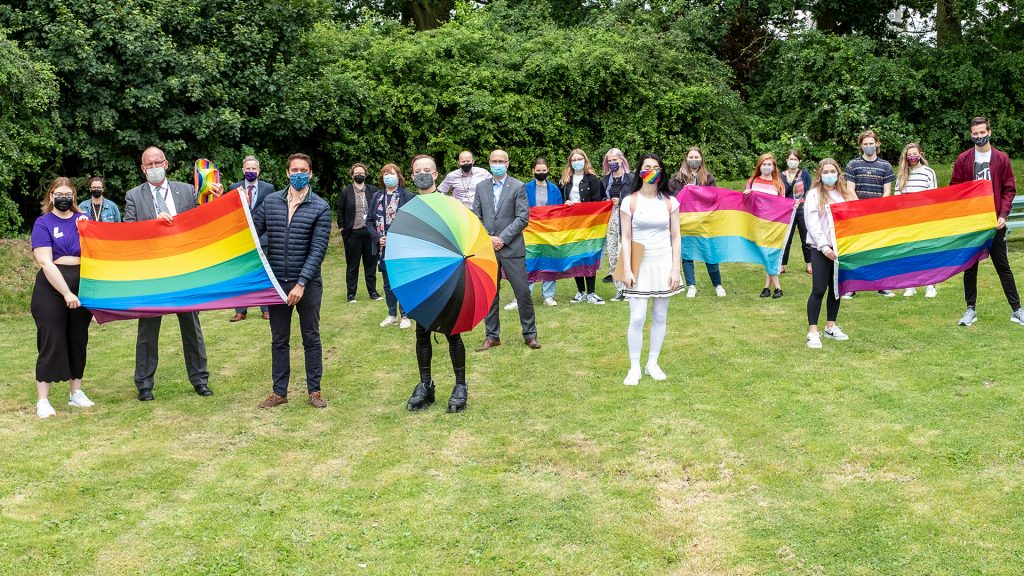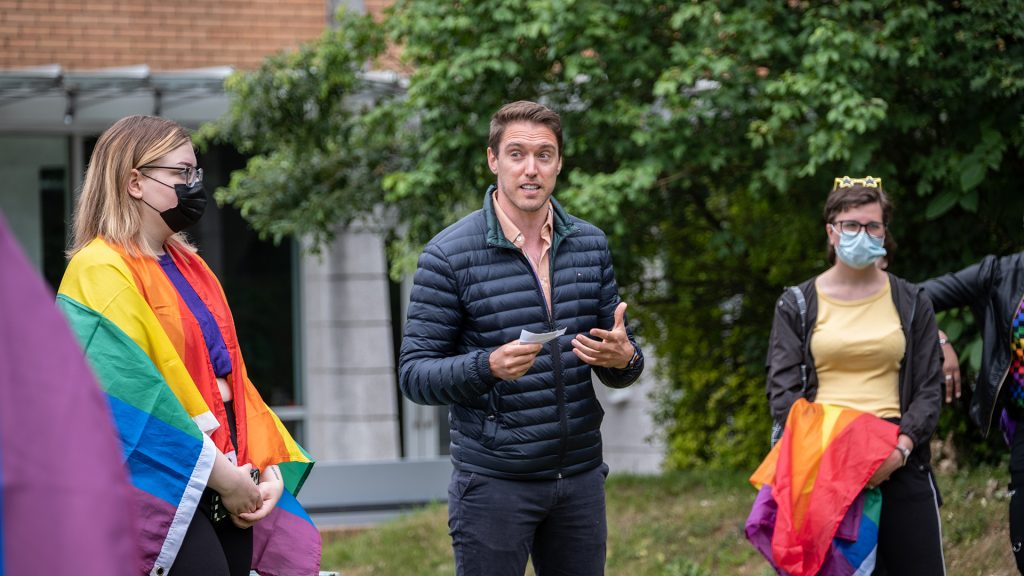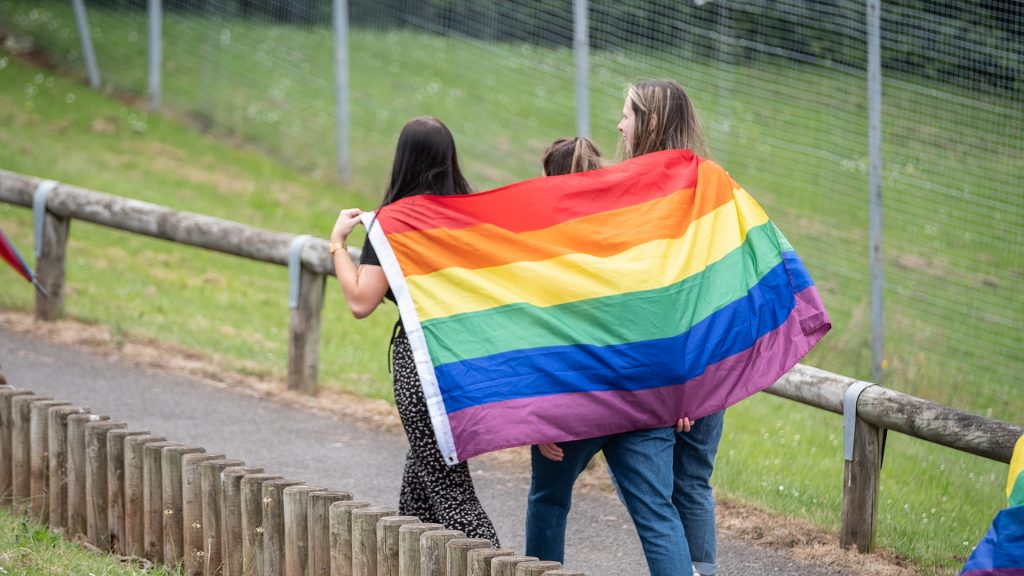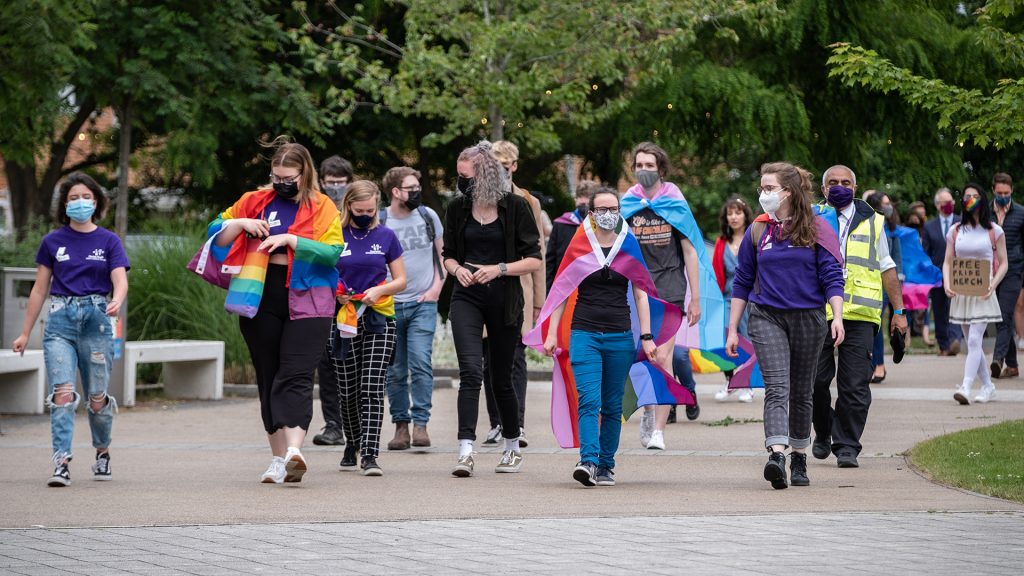The LGBT+ Staff Network: A new chair and a new direction

As part of its commitment to equality, diversity and inclusion (EDI), Loughborough University’s People and Organisational Development team has helped to establish multiple Staff Networks over the years where members can support each other, raise concerns, and influence change. There are nine Staff Networks to date, with one of the longest-serving ones being the LGBT+ Staff Network.
With a newly elected Chair leading them, the Network has undergone a change in its structure, purpose, strategy and a slight rebranding of its name – from the LGBT+ Staff Group, to the LGBT+ Staff Network. These changes aim to signal a new way of working and engaging staff across the University to facilitate LGBT+-related change and activities.
I spoke with the new Chair, Chris McLeod, to find out more about the Network’s new direction and how this will better support LGBT+ staff and allies on our campuses.
Chris, can you tell us a little bit about yourself?
“Yes of course! I’m a Research Associate and University Teacher in Psychology at the School of Sport, Exercise and Health Sciences, I’ve been at Loughborough University since 2016 and I was the LGBT+ Student Officer at Loughborough Students’ Union from 2017-2019. I’m now delighted to have been elected as the new Chair of the LGBT+ Staff Network.”

What does the LGBT+ Staff Network mean to you?
“Feeling part of an LGBT+ community has been a crucial element of my life over the last five years. When I first came out in 2008, I didn’t have people around me who had similar experiences to me, and I had no idea at that point how much an LGBT+ community would benefit my life and how much I was missing in not seeking it. Now I’ve seen how much support and strength you can get from being around others with similar experiences, I know the LGBT+ community will always be a fundamental part of me and my life. So, for me, the LGBT+ Staff Network means community, understanding and strength.”
What do you think the group’s current strengths and weaknesses are?
“When it comes to our strengths: we have a place to bring LGBT+ staff together, we have amazing staff who are keen to attend meetings and take on actions, collectively we have pushed for changes to structures, processes and LGBT+ representation here over the years, and the University acknowledges and supports our existence.
“But I also think we have a few weaknesses to address. We don’t fully understand our purpose (are we a social and support group for colleagues, or are we a group that advocates for the LGBT+ community at the University and strives for change?), we probably only regularly engage with around 2% of LGBT+ colleagues across the institution, we don’t always feel that LGBT+ specific issues are at the forefront of the mind for making systemic and structural changes on our campuses, and often we find a lot of the work we do is done by a small number of people.”
Why did you decide to change the name from ‘group’ to ‘network’? Is this part of a larger plan?
“Yes, that’s right! It may seem like a small and insignificant change, but I actually think that this small tweak will help to change the way we work, and the way staff engage with LGBT+-related activities at the University. From listening to various community voices and drawing some conclusions from this, I felt that the term ‘group’ seemed very exclusive – it’s a closed, limited and quite intimidating concept. Having a ‘group’ even led to the perception that you have to come into this closed group just to ‘be’ LGBT+ or an ally on our campuses. This is not what we want, at all! Whereas, I believe a ‘network’ in concept is very different. A network is expansive, unlimited and open where everyone who is LGBT+ or an ally on our campuses is part of the LGBT+ Staff Network – it’s not a closed group, but an open network of people. Instead of monthly meetings to enable ‘the group’ to come together, the network now has monthly meetings where any staff can come to meet and discuss issues, represent the community’s voices and provide a forum for support and to facilitate change.
“So, the name change is a small thing, but I think it plays a key role in shifting our focus from being exclusive to being expansive. Through refining how we work, I believe we can establish a position as a key EDI advisory forum for the University when systemic and structural changes are being reviewed. We can bring LGBT+ staff – as well as other minoritised and liberation communities – together to collaborate and progress EDI work. And in addition, we can ensure LGBT+ staff are at the forefront of the mind for our University’s change makers and have a seat at the table when decisions are being made.
“I appreciate this doesn’t come easy. I know there are currently resourcing and workload issues, as many staff struggle to find the time to incorporate LGBT+ advocacy and activism into their everyday roles. However, by working together as a community – both an LGBT+ community and a Loughborough community – I think we can make meaningful change to improve the experience of people working and living at this University.”

That all sounds great, Chris. Do you have a plan of action of how you plan to go about this that you’re happy to share with us?
“Yes of course. I envision us implementing these opportunities with six key changes.
- A change of concept
“I basically covered this earlier, but in short, the change from a group to a network allows us to be more expansive with our thinking. Staff can attend our monthly meetings (either regularly or ad hoc) to highlight issues, discuss campaign or event ideas and represent LGBT+ staff voices across our campuses.
2. A change of structure
“We should ensure the Chair is elected or re-elected on a specific manifesto every two or three years. This way the Chair is held accountable and is representative of the community. I also think that we should have committee positions to broaden the work we do across our campuses and to provide developmental opportunities for our LGBT+ staff. After discussing this with other Staff Support Network Chairs, and in understanding the needs of our community, roles I’d like to introduce include a Collaborations Lead, a Loughborough London Champion, and a Trans, Non-Binary and ‘Plus’ Lead, among others. These roles will be advertised on the LGBT+ Staff mailing list over the summer.
“I also want to ensure our monthly meetings are open to non-committee staff, whether it’s regularly or as a one-off, so they can fully contribute to and critique ideas, but don’t have to take on actions if they don’t want to.
3. Collaborating with others
“We need to work with others who have similar experiences and ambitions. And for those who we already collaborate with, we need to engage with them even more. This includes the student LGBT+ Association, other Staff Networks, Stonewall (through our partnership as a Diversity Champion), and external partners such as our alumni.
4. Researching University structures, processes and experiences for LGBT+ staff
“The University has a Trans and Non-Binary Working Group who, at the time of writing, have a survey running to understand the experiences of trans and non-binary students and staff at the University. This will be an incredibly helpful survey for us to have some initial understanding about the experiences of some of our LGBT+ folk. I hope we can leverage off these results to then take part in a more widespread survey looking at the University’s structures, processes and staff experience to understand how our University matches up against best practice and to find out where we can make meaningful and nuanced changes. Engaging with an external organisation and process to help us do this will be key, and Stonewall’s Workplace Equality Index may be just what we need to facilitate this!
5. Engaging in higher-level strategic planning and change for EDI at Loughborough
“In the past, Staff Networks worked in their silos. It often seemed more likely that student groups or Human Resources were able to make significant change happen. But now we have a better structure. All our Networks can come together at the University’s new EDI Advisory Forum, which feeds back information to the EDI Subcommittee (hopefully soon to be the EDI Committee), which then informs University Council who are able to make systemic changes.
“There’s also been a big shift in the Networks working with Schools and Departments across the University to facilitate change in specific areas, which is great to see.
6. Increasing our visibility
“Finally, we need to keep pushing for visibility of our Network. Whether that’s through internal forums, allies, HR, or marketing platforms such as our website, social media, and internal communication channels. We also need to increase our visibility with senior management too, and I’m delighted to announce two new Executive Sponsors of the LGBT+ Staff Network: Director of Finance Andy Stephens, and the Dean for Social Sciences and Humanities Professor Lisanne Gibson.”
That all sounds amazing Chris, and it’s been great to speak with you today. Do you have a last message for anyone reading this?
“It’s been great to speak. Thank you for giving me and the Network a forum to talk about our direction. If you haven’t already, please check out the LGBT+ Staff Network’s dedicated webpage to find out more about us. We also have a blog which regularly features contributions by our amazing LGBT+ staff who write inspiring and thought-provoking reads. You can also keep up-to-date with our initiatives by following us on Twitter @LboroLGBT.
I can’t wait to work with LGBT+ colleagues and allies across the University to move forward with this vision, and if anyone has any questions or feedback, you are welcome to email me at lgbt@lboro.ac.uk.”

Equality, Diversity and Inclusion
Reflections, comments, discussion and opinion on EDI topics from Loughborough University staff and students